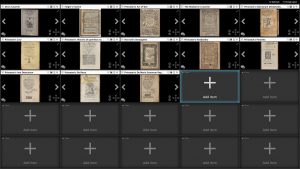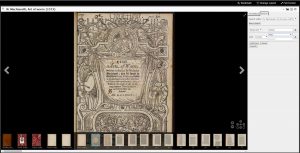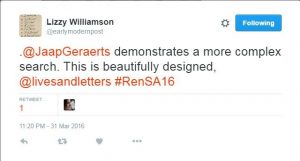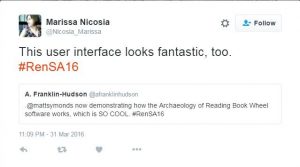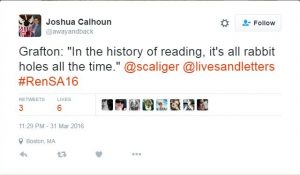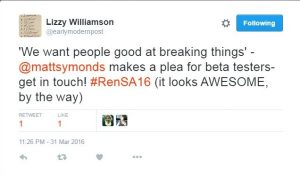Launching the viewer: RSA 2016 & Open Beta!
Ever since the start of AOR in September 2014, RSA 2016 in Boston had been firmly in the back of our minds and highlighted in our agendas (our PI Earle Havens made it a habit to remind us about this deadline wherever and whenever he could), as this was the time and place where we would launch our viewer and present it to the wider academic community. This was the moment at which more than one and a half years of blood, sweat, and tears had to come to fruition, and in the preceding months the whole team worked hard in order to get the viewer RSA-ready.
The organizers had scheduled our session at the last session (17:30-19:00) on Thursday, March 31, the first day of the conference. AOR was thus the exciting end to a wonderful CELL day, as all the CELL-sponsored panels were planned on this day, starting at 8:30 in the morning and continuing right through the end (some of them annoyingly coinciding with the amazing panels on annotated books organized by Earle, a recurring problem at RSA). All the CELL panels were chaired by our own Matt Symonds, a truly heroic effort for which he deserves great praise!
The CELL panels included a wide and stimulating variety of topics, ranging from new research on the early years of the Bodleian Library, stairs in houses in early modern London, to seeing early modern books as “pestilential clouds.” One panel was devoted to honoring Lisa Jardine and consisted of moving talks by her friends, colleagues, and students (although these distinctions tended to blur for those who were part of Lisa’s familia). Important fact: there were amazing doughnuts as well (in true Lisa style, for whom providing good and plentiful food at academic gatherings of any kind was a matter of personal pride)!
Then, finally, after already quite a long day, the AOR roundtable was to commence. Earle Havens kicked off with an introduction of the project and its relations to the wider historiography of the history of reading. After that, Chris Geekie spoke about some intricacies of Harvey’s annotations and ways in which he dealt with those. Thereafter, it was time for the moment suprême: the launch of our viewer. Matt focused on the image and transcription viewing, showing the bookwheel capacity of our viewer: its ability to open up to 25 (!) workspaces (i.e., the space in the screen where an image and a transcription panel can be opened) next to each other, making possible quick leaps within a book or from one to another book.
I took over by showing and explaining the search functionalities of our viewer, which consist of a basic (string) search and an advanced search that allows users to build complex queries. The advanced search, which is still under development, gives users the possibility to drill deep into the data and discern patterns that are difficult to discover in a traditional analog environment.
And luckily, we got some positive feedback!
Moreover, every single search result is a clickable link, with the user having the opportunity to open the search result in the current or a new workspace, further opening the possibilities to go down the rabbit hole, an expression that seems particularly suited to capturing the possibilities of doing research within the AOR viewer.
After Matt had given a demonstration of a particular search scenario based on his own research, Tony introduced the Winthrop Project to the audience. This project aims to study the library and archive of the Winthrops, an English family that emigrated to New England in the 1630s. This project is closely linked to AOR, but not only because of the shared interest in the history of reading; for the Winthrop library includes various books that were first owned and annotated by John Dee and later by several generations of the Winthrop family, and that will form part of the AOR Phase II corpus. We are very much looking forward to working together and sharing ideas (and technology!) in the coming years.
One last important message:
The AOR viewer is open for Beta testing!! You can find our website at www.bookwheel.org and or viewer by clicking on the bookwheel image at the start page or by directly going to www.bookwheel.org/demo. Please have a go at it and let us know what you think (email earle.havens@jhu.edu or m.symonds@ucl.ac.uk).

